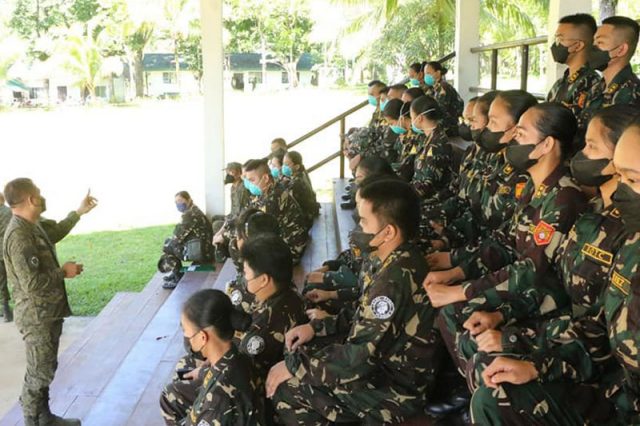
A Cabinet member was questioned for claiming that the Reserve Officers’ Training Corps can supposedly cure students’ mental health issues in an attempt to justify a measure making it mandatory.
Defense Secretary Carlito Galvez Jr on Monday attended the last hearing of the Senate Higher Technical and Vocational Education Subcommittee for the proposed reinstatement of the mandatory ROTC program.
He said that the program can train the students “to the limits” as it is “experiential” unlike the National Service Training Program or NSTP.
“Ang experience training is talagang pumupunta sa puso niya lahat ng ginagawa niya. ‘Yung survival’s instinct na andoon, so ‘yung sinasabi nating ‘yung mental problem, it can be cured kasi ‘yung frustration tolerance ng isang tao, tataas,” Galvez said during the hearing.
“Meaning, meron po siyang makukuhang experience na, ‘Bakit ako naghihimutok, eh ganito ‘yung nakikita natin na mas malala pa pala ‘yung ginagawa ng ibang tao,'” he added.
“So meaning, ‘yung mental, ano, puwede siyang ma-cure and also, sa ating training, karamihan po sa ating sundalo, they are trained as mentor, as leader, and also as counselor,” the former military general said.
“So meaning, kung merong problema ‘yung isang tao, marami po kaming… being a combat leader, na-expose po ako. Marami po sa amin may mga nag-p-PTSD [post-traumatic stress disorder] pero nabibigyan po namin ng counselling. And because of the counselling, nagbabago po ‘yung tao,” Galvez, who is also a teacher by vocation, added.
Once the proposed bill on making ROTC mandatory is signed into law, the law on the NSTP will be repealed.
Galvez’s comments alarmed some Pinoys who questioned the official about actual data claiming that the ROTC can supposedly “cure” mental health problems.
“Kumunsulta ba muna kayo sa ating mga psychologist or psychiatrist bago kayo nagbitaw ng iyong opinyon? Or is there a basis to your statement? Maybe study supporting your claim? [Kasi] kung wala at ang basis [niyo] lang is being an educator, then that disproves your claim,” a Twitter user said.
“Sad that this kind of [claim] left unchallenged by people we voted, asan scientific data to back this preposterous claim of his,” another Pinoy tweeted.
Others recalled another popular reason used by the government before to justify another controversial initiative — the emergence of Dolomite Beach.
“Hindi na lang pala ang Dolomite sa Manila Bay ang sagot sa mental health problems natin, mandatory ROTC na rin,” a Twitter user wrote.
RELATED: Mentally he’s here: Musician seen staring at Manila Bay white sand for 5 hours
Others argued that the ROTC program has a “history of violence and power-tripping.”
“This is a militaristic and unscientific solution to our mental health emergency,” a Twitter user commented.
ROTC used to be mandatory among students but it became optional when ROTC cadet Mark Chua died at the hands of an officer for exposing the corruption of his unit at the University of Santo Tomas.
Facebook page “Your Millennial Psychologist” also responded to Galvez’s comments on the ROTC program supposedly curing mental health problems.
“With all due respect, ROTC is NOT a cure for mental health problem. You cannot claim something that is unsupported. In fact, it has been recognized that there is a significant barrier [to] help-seeking efficacy among people who do military service or among ROTC students,” the page said.
It also gave a link to a study that supported the claim, titled “Identifying the Initial Mental Health Messages of Army ROTC Students and Exploring Their Connection to Mental Health Stigma and Help-Seeking Behaviors.”
“Paano mo ma-cu-cure, eh may problem pa nga sa help-seeking? May issue rin sa stigma? The mere fact na hindi mo alam ‘yan ay malaking example na ‘yan na hindi niyo po alam,” the page added.
“Saka hindi curable yan. Treatable po. Magkaiba ‘yan,” it further said.
The page is run by psychologist Riyan Portuguez.
“The purpose of this dissertation was to investigate the thoughts, feelings, and beliefs of US Army ROTC students in regards to mental health. Researchers (Seal et al., 2010) found that as much as 30% of service members who are diagnosed with a mental illness do not seek treatment,” part of the page’s cited study reads.
“Upon further investigation, Hoge et al. (2004) found mental health stigma to be a contributor to reluctance in help-seeking. The Department of Defense, therefore, instituted resilience programs to attempt to stem these issues but mental health prevalence continued to rise,” it added.
ALSO READ: Celeb reservists? Concerns over proposal to augment ‘mandatory ROTC’ personnel









